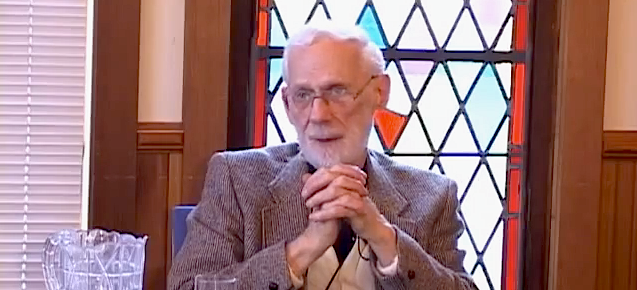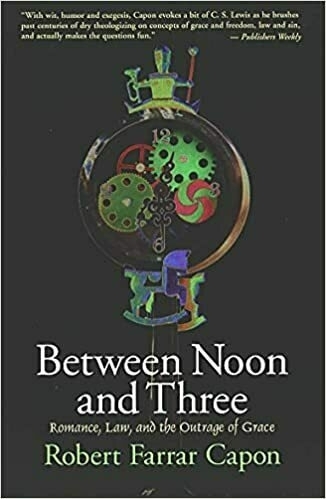Category: R. F. Capon
You are viewing all posts from this category, beginning with the most recent.
Capon’s Wager on God’s Love

I have on occasion paraphrased something Fr. Robert Capon wrote about God’s love as ”if God is a bastard, we’re all in trouble”. I went digging for the original quote today and came up short of any such choice phrase, but for reference, here’s the longer quote from Between Noon and Three which makes that point, if just a bit less colorfully:
…I have, in this parable, been working only one side of the street — in my effort to do justice to grace, I have neglected justice itself. I am fully aware that in doing so, I have laid myself open to the charge of granting not only screwing licenses but also franchises for far worse things: for pride and prejudice, for torture and exploitation — in short, for getting away with murder.
In my defense, let me point out that Scripture lays itself open to the same charge — and that the other side of the street has been worked so long, so hard, and so often that most people don’t even know there is a sunny side…
But there’s more to it than that. I have expounded Saint Paul to you as saying that not only are we dead to sin but that God is dead to it too — that he has put himself out of commission on the whole subject of blame. And so, indeed, he has: ”I will forgive their iniquity, and I will remember their sin no more.”
I am fully aware that the Scriptures are paradoxical — that God speaks with a forked tongue — and that every lovely thing he says on the side of leniency can be matched by a dozen stringencies that will curl your hair. But I am also convinced that each of us has to make a decision about such utterances. When someone tells you many different things about his attitude toward you, you must first look at him long and long, and decide for yourself whether you care about him at all. But if you finally come to the conclusion that you do care, you must then decide which of his words you will take as his governing word. You ask me why I think God’s leniency governs his severity? Why grace is his sovereign attribute? Well, all I can say to you is that having been a father who has spoken out of both sides of his mouth to six children for twenty-six years — and having all those years believed in a heavenly Father who saves us not by sitting in his penthouse issuing edicts but by sending us the warm, furry body of a Son who drank the nights away with us and died obscurely of the foolishness of it all — all I can say is that I put my bet on the left fork of the tongue. It is my best hope that when my children think of everything I have said and done to them, they choose to remember the times of my severity when I just gave them a kiss on the cheek, poured myself a Scotch, and shut up. And it is my last hope that God hopes the same for himself.
So I really do make no apology for landing on the sunny side of the street. I am sorry if I have offended you; but to me there are some things that simply override everything that comes before or after. And I am sorrier still if you do not feel the same way. For without that ultimate cassation — without that final quashing of the subpoena, that throwing of the prosecution’s case out of court which is the only music there is for the ears of the hopelessly guilty — you and I, Virginia, are simply sunk.
— Fr. Robert F. Capon, Between Noon and Three, Chapter 17

Capon on Confession
Confession is not a transaction, not a negotiation in order to secure forgiveness; it is the after-the-last-gasp of a corpse that finally can afford to admit it’s dead and accept resurrection. Forgiveness surrounds us, beats upon us all our lives; we confess only to wake ourselves up to what we already have.
-- Robert Capon, from The Parables of Grace
And tell them we are men
Douglas Wilson posted this quote, and it’s too good to not pass along.
I wish you well. May your table be graced with lovely women and good men. May you drink well enough to drown the envy of youth in the satisfactions of maturity. May your men wear their weight with pride, secure in the knowledge that they have at last become considerable. May they rejoice that they will never again be taken for callow, black-haired boys. And your women? Ah! Women are like cheese strudels. When first baked, they are crisp and fresh on the outside, but the filling is unsettled and indigestible; in age, the crust may not be so lovely, but the filling comes at last into its own. May you relish them indeed. May we all sit long enough for reserve to give way to ribaldry and for gallantry to grow upon us. May there be singing at the table before the night is done, and old, broad jokes to fling at the stars and tell them we are men . . . The road to Heaven does not run from the world but through it.
(Robert Farrar Capon, The Supper of the Lamb, p. 180).